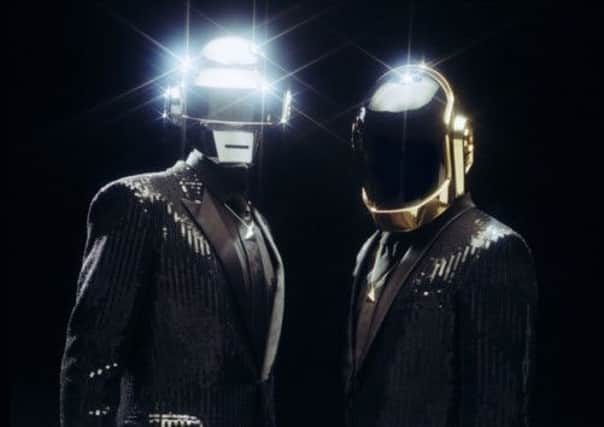Album review: Daft Punk: Random Access Memories


Daft Punk: Random Access Memories
Columbia, £9.99
* * * *
Daft Punk are a right pair of romantic old robots. Romantic in that they understand that withholding information only fires the imagination. For almost 20 years, we have known their names – Thomas Bangalter and Guy-Manuel de Homem-Christo – and nationality but not their faces. And now, following three albums, the Alive touring extravaganza and an audaciously executed soundtrack to Tron: Legacy, they have returned with freshly polished helmets to tease again, launching their latest album with a controlled dripfeed of a marketing campaign and a lavish Gatsbyesque party at London’s Shard skyscraper which they did not attend. Or did they? And how would anyone know one way or the other?
As is healthy for any group with history, Daft Punk have been taking stock, pondering their next move, even wondering if some bright young thing might come along and throw a better party than they can. But in the absence of any sufficiently ambitious challengers, they have obliged with another opus, a 75-minute epic inspired as much by classic concept albums and 1970s/80s MOR pop as it is by club culture.
Advertisement
Hide AdRandom Access Memories stands apart from most contemporary dance music in that it is neither nosebleed fast nor earthquakingly loud. Instead, the aim was to reconnect with the roots of dance music which favour the soul, the heartbeat over the pumping energy. The samples have largely been ditched in favour of live instrumentation, with modular synthesisers and drum machines as the building blocks, and they’ve invited a stellar array of collaborators along for the ride, including dancefloor maestros Giorgio Moroder and Nile Rodgers.
Random Access Memories doesn’t come close to the greatest moments of these disco legends but their involvement carries a certain reassuring cache and the rest of the guest list – Pharrell Williams, Chilly Gonzales, Julian Casablancas of The Strokes, the guy who wrote the lyrics to Rainbow Connection – isn’t too shabby either.
With Chic mainman Rodgers on board, they waste no time in deploying his instantly identifiable guitar sound alongside undulating arpeggios, the occasional sparkling synth chord and a gentle disco groove. As an album opener, Give Life Back To Music is naturally feelgood but not earth-shattering, but they persist with that gentle touch on The Game Of Love, which marries 70s lounge pop and vocoder melancholy with the same light, dreamy touch as their countrymen Air.
In fact, much of the album gives the impression that Daft Punk don’t have to try too hard. Within is a mellow piano piece fashioned from hours of material improvised by Chilly Gonzales with an oddly soulful, hangdog performance from the sad robot voice. Julian Casablancas’s distinctive drawling baritone is also treated on Instant Crush but the brooding tune is all his, while there is a pop purity to Doin’ It Right, as sung by Noah Lennox, aka Panda Bear of Animal Collective. Current single Get Lucky is as smooth and seductive as late 70s/early 80s Michael Jackson, while the straight-up FM pop of Fragments Of Time could have been lifted off a Hall & Oates album.
Beyond begins with an invigorating widescreen orchestral flourish before settling into an assured but uneventful funk track, while Motherboard is a slice of instrumental filler, presumably indicative of the reams of material recorded and then discarded. Even Lose Yourself To Dance, featuring the dream team of Rodgers and Williams, is a pretty laidback proclamation, despite the layered exhortations to “come on, come on, come on”.
Everything here makes for pleasurable easy listening but there are a couple of audacious epics which come close to justifying the hype.
Advertisement
Hide AdGiorgio By Moroder is an engaging account of the I Feel Love producer’s early musical excursions and ambitions, set to a groovy retro-futuristic soundscape, with catchy keyboard refrain, some 80s jazz funk noodling, rock guitar and Moroder’s fabulously musical Bavarian accent. If nothing else, it’s worth tuning in to hear him say “discotheque”.
A creepy intro gives way to a plaintive vocal from Paul Williams on the agreeably strange Touch. Williams is no household name, except in Daft Punk’s household, where his starring role in Brian De Palma’s musical film Phantom Of The Paradise is held in great esteem. Here, he stars in a jaunty 70s pop confection, complete with vaudeville piano and brass, and a lighter-waving contribution from a choir, which is reminiscent of Todd Rundgren in its no-holds-barred musical incontinence.
Advertisement
Hide AdHowever, those enigmatic robots hold off until the last gasp before delivering the only hardcore club track on the album. Contact, which samples astronaut Eugene Cernan of the Apollo 17 mission, builds on waves of their signature synth arpeggios and vigorous drumming to an electro rocking crescendo, like they’re throwing clubbers a bone at the end of the night. But, apart from this banging tune, Daft Punk have taken a long, hard look at dance music and decided to make a crafted pop album instead.